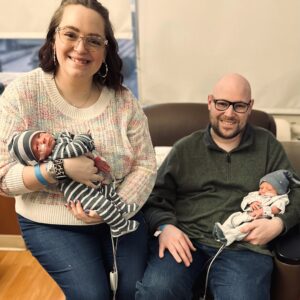Meet Bernice. At Arkansas Heart she’s an experienced PCCU nurse and so much more — a masterful baby bootie creator, coffee maker and resource for nursing wisdom, which she shares in her native New Zealand accent.
Her journey into healthcare began at only 15 years old when her family was involved in a car crash that left a child injured. Driven by instinct, Bernice leaped to tend to the child.
“I realized that if I could assist in such a tragic accident, perhaps I could extend that help to others as a critical care nurse, providing the care I would wish for myself,” she says.
In her nearly five decades-long career, with 25 years dedicated to Arkansas Heart, Bernice has earned the admiration of her colleagues and physicians, who refer to her as “Mrs. Coffee,” because she’s “always good for a hug and a cup of coffee.”
Outside of Arkansas Heart, she also thrives in her passions: embroidery, needlepoint, knitting, beading, gardening and painting.
“I started stitching as a child, and as a nurse, I’ve found it to be stress reliever in a lot of ways,” she says. “You never know what you’re going to walk into as a nurse. You hold families that are going through the most stressful times.”
Looking at her beautiful, detailed work, especially her baby booties cherished by coworkers and their newborns, it’s evident that Bernice infuses each piece with her heart and soul.
Our exceptional team members are more than just experts in cardiac care—they are individuals with vibrant lives and passions that extend far beyond the walls of Arkansas Heart. Join us in celebrating and recognizing their dedication to our patients and their personal passions. After all, it’s not just about the hearts we care for; it’s the hearts of those who care.


